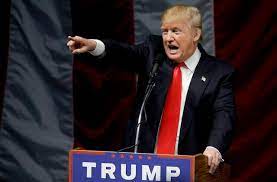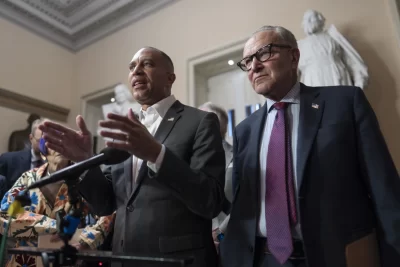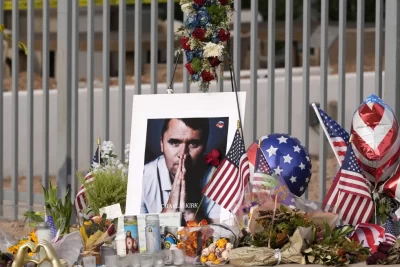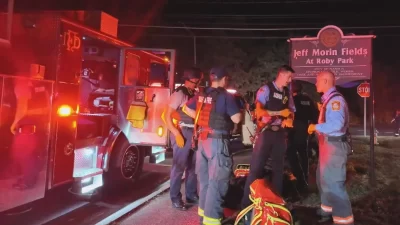
Donald Trump will make a personal pitch Friday to California Republicans in a bid to solidify his support in a GOP presidential contest he has dominated for months, while Ron DeSantis and other rivals get another chance to break the front-runner’s momentum with time fast vanishing to reorder the race.
Trump’s afternoon speech at a state Republican Party convention in Anaheim comes two days after he bypassed the second GOP debate held at Ronald Reagan’s presidential library northwest of Los Angeles, signaling again that he sees no need to appear side-by-side with lesser-known contenders.
At stake in the state’s March 5 primary will be 169 delegates, making it the biggest prize in the Republican contest. Any candidate who collects more than 50% of the votes in the primary would win all the delegates up for grabs.
The kickoff Iowa caucuses that mark the start of the nominating season are less than four months away, and the trajectory of the race could shift. Still, Trump is likely to get a hero’s reception from party loyalists in a state that he lost to Joe Biden in a landslide in 2020 while also receiving over 6 million votes — more than any Republican presidential candidate before him. Recent state polling suggests that Trump is the strong front-runner there in the contest for the Republican nomination, as he is nationally.
Crowds at state party conventions tend to be thick with conservative grassroots activists, an ideal setting for the former president, even as he faces felony charges in four criminal cases.
With time to shake Trump from his commanding position growing shorter every day, DeSantis was among the candidates during the debate who sharply criticized Trump in his absence.
“He should be on this stage tonight,” said the Florida governor, who has tried to establish himself as the leading Trump alternative. “He owes it to you to defend his record where they added $7.8 trillion to the debt. That set the stage for the inflation we have now.”
Trump instead traveled Wednesday to battleground Michigan, where he sought to win over blue-collar workers during the autoworkers strike. He used the occasion to taunt his rivals, whom he suggested would be looking for jobs in a second Trump administration.
“Does anybody see any VP (vice president) in the group? I don’t think so,” Trump said at a car-and-truck parts manufacturer near Detroit.
Not surprisingly, Democratic groups planned a protest near the convention site.
“When the leading candidate of a major political party is under indictment for attempting to overthrow free and fair elections, every voter needs to stop and think about where our country is headed,” San Bernardino County Democratic Party Chair Kristin Washington said in a statement. “The last thing any American needs is to relive that madness.”
A Public Policy Institute of California voter survey released Wednesday, but conducted in late August and early September, found Trump with support from nearly half of the likely Republican primary voters. DeSantis was far back, at 14%, with the rest of the field lagging in single digits.
The large gap between Trump and the remainder of the field largely mirrored the results of many other state and national polls.
California — where Democrats hold every statewide office, dominate the Legislature and congressional delegation and outnumber registered Republicans by about 2-to-1 — is not expected to be competitive in the November 2024 presidential election.
The last Republican to win a presidential contest in California was George H.W. Bush in 1988. You’d have to go back to 2000 to find a Republican nominee who made a significant effort to win California, when George W. Bush invested millions in the state then lost to Democrat Al Gore by 12 points.
For Republican nominees, California mainly serves as a font of campaign cash.
A state GOP rule change in July opened the possibility that Trump could sweep the state’s trove of delegates when California is among more than a dozen states participating in the Super Tuesday contests.
Under the change, a Republican presidential candidate who pulls in more than 50% of the primary vote would be awarded all 169 delegates. If no candidate hits that threshold, delegates will be awarded proportionally. Such a winner-take-all rule didn’t exist in recent presidential elections in the state.
Similar rule changes seen as benefiting the Trump campaign are playing out elsewhere, including in Michigan and Nevada.





